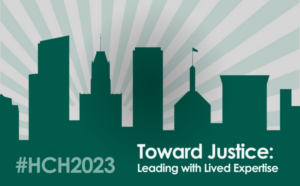Alcohol, heroin, fentanyl, and a host of other substances compound the complexity of healing without having a place to call home. Substance use disorders are epidemic; overdoses are at an all-time high. The effects frequently lead to cycling from the streets to the hospital to jail to shelter to the streets and back to the hospital. The time between the revolving doors goes down with each repetition. Heath continues to decline, and even though hospitals are reluctant to discharge people to the street, at some point they must.
Harm reduction strategies coupled with medical respite care can begin to reduce the impact of inequity across socio-economic status, race, gender identification, trauma, and class, using practical, non- judgmental strategies, one person at a time. Coming from backgrounds that include recovery, the presenters believe the results are indisputable: health is improved, Medical respite providers see the results of this cycle every day. Harm reduction is an evidence-based
practice that can be used to provide the opportunity and support people need to begin moving toward
healthier lives.
Speakers: Sherri Downing: Senior Program Manager II, Advocates for Human Potential
Session Materials:



